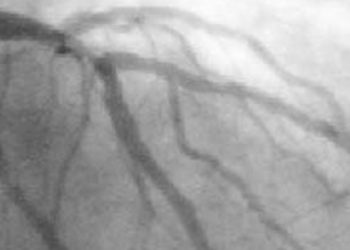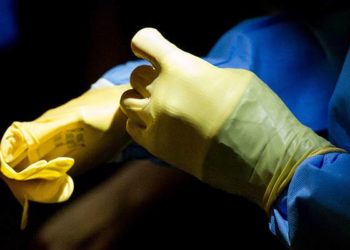Transcatheter aortic valve implantation non-inferior to surgical replacement in low-to-intermediate risk patients
1. In this randomized controlled trial, it was found that those who received transcatheter aortic valve replacement (TAVI) did not have an increased risk of stroke and all-cause mortality compared to those who received surgical replacement (SAVR).
2. Those who underwent a transcatheter procedure had significantly fewer major bleeding events compared to those who underwent surgical replacement.
Evidence Rating Level: 1 (Excellent)
Study Rundown: TAVI has largely replaced SAVR as the first-line treatment for patients with severe, symptomatic aortic stenosis who are at high surgical risk. While TAVI is also commonly used in younger and lower-risk patients, comparative trials of the two approaches have been industry-sponsored and performed with specific devices in specific populations, making the results difficult to generalize. This multicenter trial, titled DEDICATE, was designed to directly compare the two procedures in lower-risk patients while allowing operative teams to customize details such as access strategy and valve selection to individual patients’ medical considerations. It was found that TAVI was noninferior to SAVR concerning the composite of stroke and all-cause mortality at one year. Individual endpoints and secondary outcomes, such as new atrial fibrillation and prosthetic-valve dysfunction, occurred similarly or less frequently among those who received TAVI versus those who received SAVR. Still, those who received TAVI did have a higher incidence of pacemaker implantation. Major bleeding occurred significantly less frequently among patients who received TAVI as compared to those who received SAVR, but vascular access-site complications arose at a much higher rate. Due to patient preference, this study was limited by a relatively short follow-up period and significant crossover from the SAVR group to the TAVI group. However, these results suggest that TAVI is a feasible strategy for treating severe aortic stenosis in patients at low or intermediate surgical risk.
Click here to read the study in NEJM
In-Depth [randomized controlled trial]: In this multicenter trial conducted in Germany, 1,414 patients over the age of 65 who had symptomatic, severe aortic stenosis were randomly assigned in a 1:1 ratio to receive either TAVI or SAVR. Of note, a total of 70 patients who were assigned to the SAVR group were treated with TAVI, and 12 patients assigned to SAVR crossed over to TAVI. In the as-treated population, the primary outcome at 1 year was 5.6% in the TAVI group and 10.1% in the SAVR group (hazard ratio [HR], 0.54; 95% confidence interval [CI], 0.36 to 0.80). The incidence of death from any cause was 2.6% in the TAVI group and 6.2% in the SAVR group (HR, 0.43; 95% CI, 0.24 to 0.73); the incidence of stroke was 2.9% and 4.7%, respectively (HR, 0.61; 95% CI, 0.35 to 1.06). Cardiovascular death occurred in 2.0% of the patients in the TAVI group and 4.4% of those in the SAVR group (HR, 0.47; 95% CI, 0.24 to 0.86). New-onset atrial fibrillation occurred in 12.4% of the patients in the TAVI group and 30.8% of those in the SAVR group (HR, 0.36; 95% CI, 0.28 to 0.46); permanent pacemaker implantation was required in 11.8% and 6.7% of the patients, respectively (HR, 1.81; 95% CI, 1.27 to 2.61). Prosthetic-valve dysfunction was noted in 1.6% in the TAVI group and 0.6% in the SAVR group (HR, 2.44; 95% CI, 0.87 to 8.15). Aortic-valve reintervention, valve thrombosis, and endocarditis occurred at similar rates between groups. The incidence of major bleeding was 4.3% in the TAVI group and 17.2% in the SAVR group (HR, 0.24; 95% CI, 0.16 to 0.35). Acute kidney injury of stage II or III occurred in 1.3% of the patients in the TAVI group and 2.5% of those in the SAVR group (hazard ratio, 0.56; 95% CI, 0.24 to 1.21); myocardial infarction occurred in 1.0% and 2.1%, respectively (hazard ratio, 0.51; 95% CI, 0.20 to 1.19). In summary, these results suggest that, for patients with severe aortic stenosis at lower surgical risk, TAVI was noninferior to SAVR.
Image: PD
©2024 2 Minute Medicine, Inc. All rights reserved. No works may be reproduced without expressed written consent from 2 Minute Medicine, Inc. Inquire about licensing here. No article should be construed as medical advice and is not intended as such by the authors or by 2 Minute Medicine, Inc.








